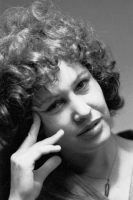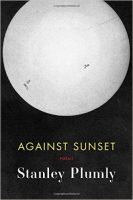November 17, 2016
Edited by David Sanders
Specimen Days
1704—Salomeja Neris, [S Bacinskaite-Buciene], Latvian poet, is born.
1899—Roger Vitrac, French poet/dramatist (Coup of Trafalgar), is born.
1905—Wazyk, [Adam Wagman], Polish poet/author (Eyes & Mouth), is born.
1936—Dahlia Ravikovitch, Israeli poet (d. 2005), is born.

And so the moss flourishes, the seaweed
whips around,
the sea bursts forth and rolls back —
and still they seem motionless.
Till a little seal comes to rub up against the rocks,
comes and goes.
And suddenly the rock has an open wound.
I told you, when rocks crack, it comes as a surprise.
All the more so, people.
—from “Pride” by Dahlia Ravikovitch
[transl. Chana Bloch and Ariel Bloch]
“I told you, when rocks crack, it comes as a surprise. / All the more so, people.” – Dahlia Ravikovitch
World Poetry
Dark Shadow

Master Corporal Matiru deployed four times to Afghanistan, with the 1st Battalion, Princess Patricia’s Canadian Light Infantry and then with Joint Task Force X. He wrote Dark Shadow during his third tour. MCpl. Matiru took his life on Jan. 15, 2013.
Master Corporal Matiru deployed four times to Afghanistan. He wrote “Dark Shadow” during his third tour.
Recent Reviews
Best Poetry of the Month: Philip Levine, Christian Wiman, Paul Muldoon
by Elizabeth Lun
The Last Shift (Knopf) brings together the final poems by Philip Levine, one of America’s most-beloved poets whose awards include a Pulitzer and two National Book Awards. Levine had chosen these poems before his death in 2015 and had asked his friend the poet and critic Edward Hirsch to determine their order. The resulting pages feel like a long, subtle goodbye; the speaker recalls scenes from his working-class background in Michigan and the places and people that shaped his writing.
All Volta
A review of Lyn Hejinian's 'The Unfollowing'
By Tim Wood
The poems in Lyn Hejinian’s The Unfollowing are to the sonnet what the prose poem is to verse. They are fourteen lines long and, more importantly, poems of love and loss. In the book’s press materials, Omnidawn publisher Rusty Morrison tells us that the poems are “a sequence of elegies” and that “they are not sonnets but antisonnets.” By disclaiming the sonnet, Morrison reaffirms Hejinian’s own sense of the poems.
The Weird and Beautiful War Poetry of Solmaz Sharif
by Alexander Nazaryan

One poem lists American military operations: Beastmaster, Hickory View, Riverwalk, etc. Another lingers with dark, dry humor on “WARHEAD MATING” and “HEIGHT HOLES.” A third injects missile-technology lingo into the Book of Ecclesiastes: “For what is your life? It is even a THERMAL SHADOW.” The poet responsible for these verses is Solmaz Sharif, and when I meet her at a fashionable Oakland, California, café, she looks like one of its fashionable denizens, not someone who, by next week, could be the winner of the National Book Award for Look, her first book of poetry, which is political and confessional—and which relies heavily on terminology from the U.S. Department of Defense’s Dictionary of Military and Associated Terms.
The Map and the Clock Review – A Delicious Mix of Ancient Poetry and Contemporary Wit
This out-of-the-ordinary anthology curated by Carol Ann Duffy and Gillian Clarke is playful, enigmatic and heart-rending
by Kate Kellaway

Every now and then, a book comes along that insists on shouldering individual collections temporarily aside. The Map and the Clock is an anthology of chronologically organised British poetry, an out-of-the-ordinary compilation – big as a brick – that will keep me reading for as long as it lives on my shelves. In her introduction, Carol Ann Duffy describes the search for poems, with Gillian Clarke, and the discovery that Shakespeare’s line still holds: “The isle is full of noises.” Their resolve was not only to include great poems, but to go under the radar, to avoid waving union jacks, to surprise us and themselves.
Solmaz Sharif’s first book “Look” is political, confessional, and relies heavily on terminology from the U.S. Department of Defense’s Dictionary.
Broadsides
What Is The Most Underrated American Poem?
by Dean Rader
A few years ago, I wrote a blog post for Best American Poetry in which I asked readers if there were iconic contemporary American poems—poems that would endure or that would be taught the way we teach “The Snow Man” or “The Love Song of J. Alfred Prufrock” or “The Red Wheelbarrow.” Not surprisingly, there was no consensus. Lately, though, I’ve been curious about ignored or overlooked poems.
On Staying and Fighting, and Finding Strength in Poetry
by Garnette Cadogan
“Where shall we go?” a dear friend asked the day after the election. “Are you going to leave?” inquired another. I lament to a neighbor how one man’s rise to high office feels like a descent for the rest of us. “If you don’t like the results,” someone then declared, “you can go back home to Jamaica.” Well, I’ve spent over two decades making the United States home. I have no intention, nor any desire, to leave. There are many who would love nothing more than to see their country free of complexions, accents, and beliefs they don’t think belong. But here’s the thing: it’s not only their country. To leave would be to give validity to the lie they have told themselves and keep repeating to us. They’ve swapped their country’s aspirational motto of e pluribus unum for the belittling “Go home!” But this country is my home. I’m not going anywhere. They will have to deal with my foreign, accented, black ass.
What is the most underrated American poem?
Drafts & Fragments
In ‘Iron Moon,’ Poets Who Know What Work Is
by Andy Webster

The Qin Xiaoyu and Wu Feiyue documentary “Iron Moon” has a slowly mounting, but lingering, impact. The film concerns poets in Southern China who, while enduring arduous, sometimes hazardous conditions in working-class occupations, preserve their spirits with verse. Its inspiration is Xu Lizhi, the 24-year-old poet and laborer at a Foxconn electronics factory in Shenzhen, Guangdong Province, who leapt to his death in 2014. Mr. Xu was one of the countless workers from the countryside who travel to China’s growing cities seeking employment, only to be eaten alive by the tedious, pitiless demands of industry.
The Qin Xiaoyu and Wu Feiyue documentary “Iron Moon” has a slowly mounting, but lingering, impact.
Poetry In the News
Leonard Cohen, Singer/songwriter and Master Poet, Dies at 82

2016 has claimed another music legend: Leonard Cohen has died at 82, leaving behind one of modern music's most influential songbooks. The gravelly voice behind songs such as Hallelujah, Suzanne and Bird on a Wire, Cohen was a virtuosic songwriter who grappled with his mortality through his darkly evocative folk music.
People Are Turning to Poems Post-Election
More poems from Poets.org have been shared in the past two days than in any other forty-eight-hour period in the past four years. People are turning to poems seeking language, powerful and precise, to cope with this moment in our country when divisiveness has become so painfully clear.
2016 has claimed another music legend: Leonard Cohen has died at 82, leaving behind one of modern music’s most influential songbooks.
New Books
Against Sunset: Poems by Stanley Plumly
[Hardcover] W. W. Norton & Company, 112 pp., $25.95

Whether addressing the deaths of friends and other poets or celebrating the closing of the day and the autumn of the seasons, Against Sunset reveals Stanley Plumly at his most personal and intimate. As much an homage to the rich tradition of the Romantics as it is a meditation on memory itself, these poems live at the edges of disappearances.
Mephistos and Other Poems by Michael McClure
[Paperback] City Lights Publishers, 184 pp., $16.95
A landmark work of bio-romanticism, Mephistos and Other Poems is the first completely new collection in five years from legendary Beat and SF Renaissance poet Michael McClure, reflecting his interests in mammal consciousness and ecological survival. The title sequence stems from McClure's ongoing "grafting" experiment, growing new poems from fragments of previously ones. "Some Fringes" is a series of haiku-like nature poems, while the seventeen-part "Rose Breaths" derives from the poet's practice of meditation. The freestanding poems grouped under the title "Being" pay homage to many of McClure's collaborators and fellow travelers like Bruce Conner, Terry Riley, and Dave Haselwood.
Selected Poems 1968-2014 by Paul Muldoon
[Hardcover] Farrar, Straus and Giroux, 240 pp., $27.00

Selected Poems 1968–2014 offers forty-six years of work drawn from twelve individual collections by a poet who “began as a prodigy and has gone on to become a virtuoso” (Michael Hofmann). Hailed by Seamus Heaney as “one of the era’s true originals,” Paul Muldoon seems determined to escape definition, yet this volume, compiled by the poet himself, serves as an indispensable introduction to his trademark combination of intellectual hijinks and emotional honesty. Among his many honors are the Pulitzer Prize for Poetry and the Shakespeare Prize “for contributions from English-speaking Europe to the European inheritance.”
A Horse with Holes in It: Poems by Greg Alan Brownderville
[Paperback] LSU Press, 80 pp., $17.95
A Horse with Holes in It, Greg Alan Brownderville’s third collection of poetry, employs inventive phrasing and vivid imagery to construct a particular life marked by religion, confused by desire, dulled by alcohol, and darkened by death. But Brownderville also skillfully uses humor to soften the disquieting images that haunt these stanzas. Strange stories wind through these poems: Two method actors live as lovers in a wartorn city and take the stage in an empty playhouse. A poet confesses to killing thousands of Arkansas blackbirds via folk magic. A preteen boy, deeply involved in an underground religion, is pressured into marrying a dangerous demon. Brownderville’s poems examine a soulscape wrecked almost beyond recognition and dig deeply through the ruins.
The Blood and the Bone and the Flesh of It All: New & Selected Poems by Jim Simmerman
[Hardcover] Gorsky Press, 128 pp., $24.95

Through his five poetry collections starting with Home in 1983 and ending with American Children in 2006, Jim Simmerman built a reputation as one of America's foremost poets. His poems were evocative and intimate, conversational and deceptively penetrating. He wrote about isolation, loneliness and regret in ways that rose above self pity. He brought a tenderness to pain, a delicacy to hard-fought truths. His final, unpublished poems were devastating and wise. Now, ten years after his death, editors James Jay and Miles Waggener have collected the best of Simmerman's career, some of the greatest hits that earned Simmerman nominations for the Pulitzer and National Book Award, and new, previously unpublished works, into a single volume. The Blood and the Bone and the Flesh of It All resurrects a unique and vital voice in American letters.
Through his five poetry collections, Jim Simmerman built a reputation as one of America’s foremost poets.
Correspondences
Contending with Ruin
by Dana Levin
“I’ve never understood why mindfulness couldn’t be constituted by a brimming-full mind,” writes Matt Donovan in his new book of essays, A Cloud of Unusual Size and Shape, and this book brims indeed. In one essay, Donovan leaps from Bashō to First Lady Helen Taft to shipwrecked Aeneas to the bombing of Hiroshima, all while detailing the peculiarities of the history of Washington, D.C.’s famous cherry trees. In another he chronicles how a minimalist sculpture of a halved pillow on a blue pedestal, constructed by a friend with cancer, calls to mind the bust in Rilke’s “Archaic Torso of Apollo” and its famous last line, “You must change your life.” Donovan’s mind moves like a Tesla coil, riding the energetic frequencies between polarities and points of experience: the book is a compendium of synaptic flairs.
Poet Carolyn Forche a Witness to War and Turmoil
by Victor D. Infante

In a phone conversation last week, poet Carolyn Forche said she was looking forward to returning to Worcester. She’s not been here since 1979, when she did a reading at the Worcester Public Library, but remembers it as a “vibrant poetry center.” “I enjoy giving readings,” she says. “There’s something that happens with the audience in a live reading that can’t happen with the book by itself … There’s something effervescent about the performance, how it’s there and then it’s over.”
Carolyn Forche is returning to Worcester.
Envoi: Editor’s Notes
In the wake of last week, many have turned to poetry for comfort and consolation. Also, I believe, they've come to it as a way to articulate that which might seem beyond words. It’s not. We just have to search them out. Here’s one of my favorites—something to keep in mind at times such as this:
The Mower
by Philip Larkin
The mower stalled, twice; kneeling, I found
A hedgehog jammed up against the blades,
Killed. It had been in the long grass.
I had seen it before, and even fed it, once.
Now I had mauled its unobtrusive world
Unmendably. Burial was no help:
Next morning I got up and it did not.
The first day after a death, the new absence
Is always the same; we should be careful
Of each other, we should be kind
While there is still time.
“The mower stalled, twice; kneeling, I found / A hedgehog jammed up against the blades, / Killed.” – Philip Larkin